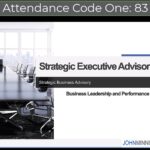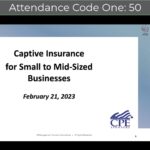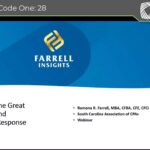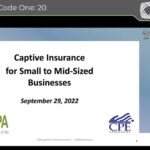Part of one’s duty as a CPA working in industry is to safeguard the assets of the organization. Cost cutting is one way to preserve assets and maintain a company’s competitive position in the industry. However, what keeps us from ridding our organizations of unnecessary costs? In this course, we will look at the factors that prevent our companies from being as streamlined as they could be. By using statistics and survey data, we will attempt to show how to better negotiate and navigate budgeting and contracting decisions. We will also discuss financial statement analysis techniques, benchmarking, and cash flow management in an effort to better cut costs and maintain the long-run viability of an organization.
Strategic Business Advisory (LIBIZ15/23)
Businesses are experiencing constant change and increasingly recognizing that what happened last year may not have as much relevance to decisions they’re making now. In an ever-changing business landscape, it’s important to position yourself as true business partner in your C-suite. As the CFO role continues to evolve, we will share best practice tips on business strategy including business performance resources such as strategy pyramids, strategy maps, and balanced scorecards. We’ll also cover business leadership including ways to develop a broader skillset. Discussion Leader: John Minnich
Captive Insurance for Small to Mid-Sized Businesses (LIBIZ05/23)
Captive Insurance has been utilized by Fortune 500 Companies for decades and is no longer just for big businesses. Thousands of small to mid-sized businesses enjoy the benefits of owning a Captive Insurance Company. This presentation provides practical Captive information useful for CFOs, Controllers, CPAs in public accounting and their clients.
Metrics That Matter Most to The Modern CFO (LIBIZ02/23)
Improving financial results begins by choosing the right key performance indicators. After all, what gets measured gets managed. But with so much data available, how do finance leaders decide which KPIs to track?
Leadership- The Great Resignation (LIOT13/23, LIOT08/24, LIOT06/25)
In this course we will explore “The Great Resignation” and discuss whether it is a temporary phenomenon or the new labor market. As a manager, are you feeling frustrated by the changes the pandemic has brought to the workforce? Is there a new social contract between employer and employee? How is leadership responding to the changing mindset of what it means to work? Learn techniques that might help to transform your company’s hiring strategies. Discussion Leader: Ramona Farrell, Leslie Hayes, and Kamber Parker
Critical Skills for CFO & Controllers: Budgeting & Forecasting Strategies for Today’s World (LIMG07/23, LIMG15/24)
The budget and the forecast are two common tools used by controllers and CFOs across almost every industry. However, are we really getting the most out of these tools? Or are we merely replicating whatever was done last year? In this course, we will use examples and illustrations to demonstrate various budgeting and forecasting techniques. We will discuss traditional approaches, as well as newer approaches such as flexible budgeting, in an effort to show how companies can gain more value. Discussion Leader: David Peters
More Money at the End of the Month: Strategic Ways to Improve Cash Flow (LIMG06/23)
Cash flow management is often the most important task of any CFO or financial leader. Regardless of whether one works in start-ups or established companies, non-profit or for-profit entities, cash flow makes our organizations run. Have you ever wondered whether you are optimizing your company’s cash flow? In this course, we will explore how to improve your company’s cash flow using analysis and financial theories in the context of real-world situations.
A Controller’s Guide to Assessing the Risk of Your Organization (LIAA16/23)
Gone are the days where the CFO simply manages the preparation of financial statements for the organization. Now, more than ever, CFOs are responsible for other operational parts of the organization, including risk management. This course is a how to guide for CFOs that are being asked to take on the role of risk manager for their companies. Discussion Leader: David Peters
Captive Insurance (LIMG03/23)
Alternative Risk Transfer is a good business solution for many small to mid-sized businesses that seek the benefits of owning their own insurance company, known as a Captive. Learn the reasons why more than 90% of Fortune 500 Companies have owned Captives for decades. Discussion Leader: Jeremy Colombik
Financial Statement Analysis (LIMG05/23, LIMG08/23)
Financial statements are a window into what is going on in the day-to-day operations of the company. They help us see what the company’s strengths and weaknesses are. However, financial statements can often have different messages depending on the user. Through multiple case studies and discussions, we will discuss proven financial statement analysis techniques, like ratio analysis, as well as some lesser known ones, like core earnings. Through these methods, we will help you see beyond the numbers and better understand the story the financial statements are telling. Discussion Leader: David Peters










